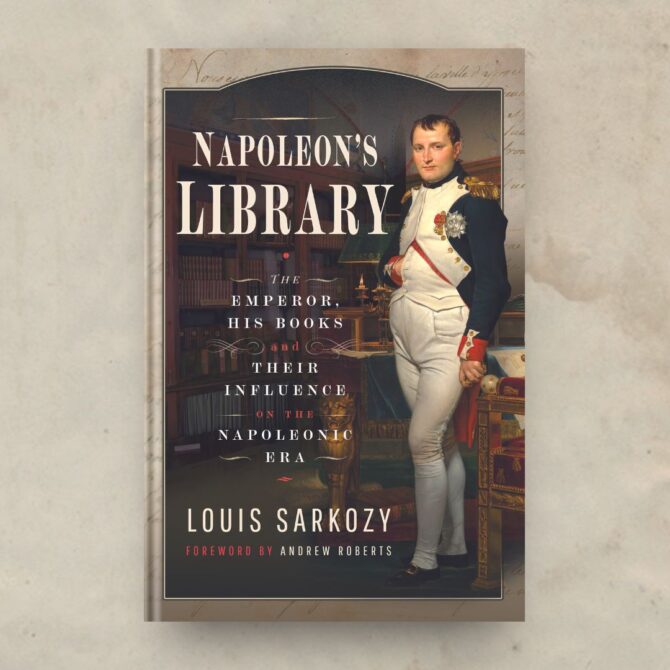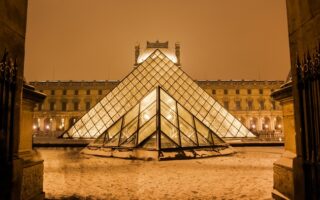Dispatch from the House of Lords: Louis Sarkozy on Napoleon
“If you want things done well, do it yourself.” -Napoleon Bonaparte (1769-1821)
Louis Sarkozy, the talented son of the former French president and Cécilia Attias, has just published a captivating biography of Napoleon, entitled Napoleon’s Library: The Emperor, His Books, and Their Influence on the Napoleonic Era. The author dedicates his book “to the two greatest women I have ever known: my mother, Cécilia, and my wife Nathalie. And to my father, who gave me my first book.”
Recently at the House of Lords, London — invited by Lord Andrew Roberts of Belgravia — Louis Sarkozy presented his book to guests including his wife Nathalie, papa Nicolas Sarkozy, stepmother Carla Bruni Sarkozy and his mama Cécilia Attias. I was honored to be invited to the event, which included luncheon and a Napoleon-themed talk with Mr. Roberts.
“The most annoying thing about Ridley Scott’s film Napoleon is that you never see him with a book, and he was a bibliophile, unlike many kings and generals of his era,” observed Louis Sarkozy. Just 27, Sarkozy was visiting Europe from Washington, D.C., which he has called home since the breakup of his parents’ marriage in 2007.
Roberts writes in his introduction to Sarkozy’s fascinating book: “A generation who are uneducated about the emperor, having seen Scott’s film, will think him a charmless dolt. It is the role of excellent books such as this one to correct this latest Hollywood myth and resuscitate the intellectual reputation of the man who Churchill called “the greatest man of action since Julius Caesar.” What a shame it is, therefore”, observes Lord Roberts, “that Sir Ridley Scott failed to engage M. Sarkozy as the historical consultant for his recent blockbuster movie, which did not so much as show a single book in its interminable two hours thirty-eight minutes.”
“Not a lot of people realize that Napoleon left not only a military heritage, but also a literary legacy,” Sarkozy explained. He had a love of culture; he was an intellectual who wrote erotic love letters to his 28 mistresses. (“I’m coming home tonight”, he writes to Josephine from a battle ground, “don’t wash.”) And Sarkozy believes that Bonaparte’s reading before campaigns, unlike most kings and generals, helped him to victory.

Joaquin Phoenix as Napoleon in Ridley Scott’s movie. Sony Pictures.
This book is a peek into Napoleon’s character: what was he like alone at night by his fireplace? Every year of the reign the same cycle played out. Napoleon, his family and his court, would spend the spring and fall at Rambouillet, Fontainebleau or Compiègne, and summer at Saint-Cloud and Trianon. Winter was reserved for the Tuileries. At each of these residences a fully functioning updated library would be waiting for him. Jean Jacques Rousseau (his first true literary idol), Racine, Voltaire, Corneille, Goethe, Madame de Stael were among his favorites.
In 1795, two years after the siege of Toulon, he wrote Clisson and Eugénie, a novel about the doomed love affair of an officer, Clisson, and his unfaithful wife. He was a profuse reader of love stories, novels, trash, romances, including L’Astrée by Honoré d’Urfé, which he said gave him “bizarre and romantic notions of human life.” He also read Plutarch’s Lives, which he adored, instilling in him his republican spirit.
“The life of Napoleon Bonaparte is a literary one, and it is my mission to share this little-known facet of his character,” said the author. How exciting when Sarkozy tipped his beret towards Jean Christophe Bonaparte (37), heir apparent to the dynasty (and Bonaparte’s great-great-great nephew) for his insights into his illustrious ancestor, and whose resemblance to Napoleon I is striking. “Meeting, and conferring with Louis Sarkozy, I very much enjoyed learning more interesting facets of my ancestor, including plenty of uncovered insights and anecdotes that I didn’t know,” said Bonaparte.
When Napoleon was sent into exile on Saint Helena Island (1815), books dominated his life. After losing command over armies and ministers, he retained power over his books which became, from dawn to dusk, his most loyal and trusted companions.
“Whether this is your first or fiftieth book about Napoleon, you will come away from Napoleon’s Library with a fresh, deeper perspective on the most fascinating person of the modern age and the ideas that shaped him,” sayid Everett Rummage, host of the Age of Napoleon Podcast.
Lead photo credit : Napoleon’s Library: The Emperor, His Books, and Their Influence on the Napoleonic Era
More in book review, books, Louis Sarkozy, Napoleon, Reading




